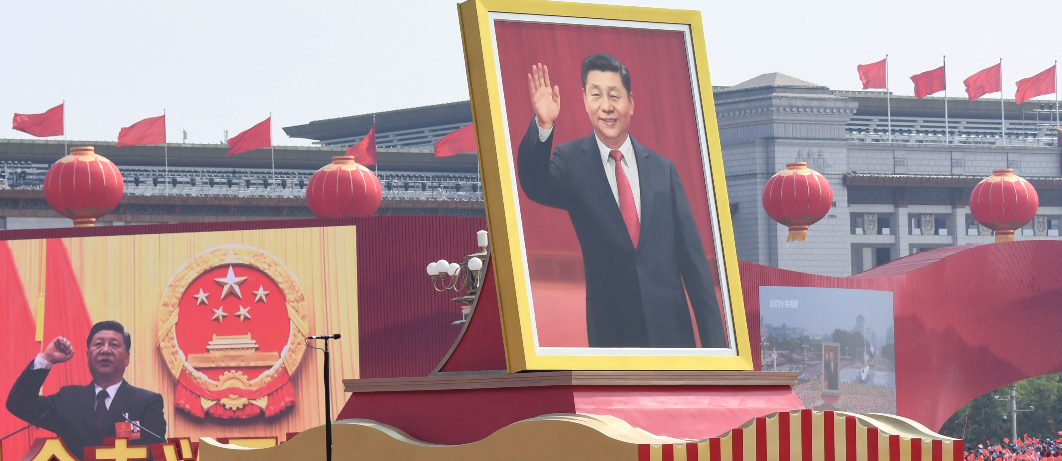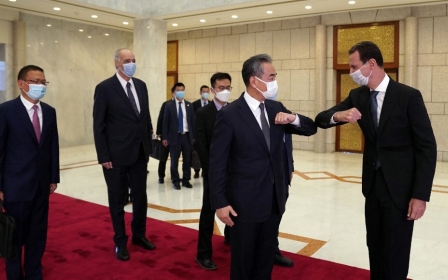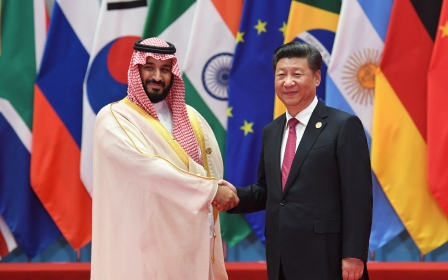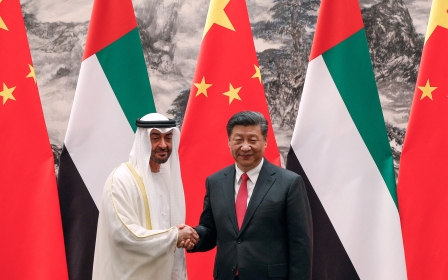US-China tensions cloud Israel free trade deal

Dennis Zhu has been tracking progress on a free trade agreement between China and Israel for years. With the two countries inching closer to a deal - potentially just months away - the business owner from the southern Chinese province of Guangdong is brimming with optimism.
"The Israeli people are so forward-looking and more open to new ideas," Zhu told Middle East Eye. "They don't only care for western brands."
Zhu exports Chinese vehicles to Israel and his enthusiasm is backed by data. Today, the best-selling electric vehicle in Israel is the Geometric C, a little-known car in the West, produced by Chinese automaker Geely.
From an economic perspective, a free trade agreement (FTA) makes sense.
'There is foot-dragging on the Israeli side. They are still moving too slow [to] act on our concerns about China'
- US official
China is Israel's third-largest trade partner behind the EU and the US. Since the two started FTA talks in 2016, the value of trade has grown from $10.96bn to $18.16bn in 2021. Israel's January-August 2022 value of trade in goods ($13.89bn) has already surpassed last year's levels.
New MEE newsletter: Jerusalem Dispatch
Sign up to get the latest insights and analysis on Israel-Palestine, alongside Turkey Unpacked and other MEE newsletters
Zhu says a deal would have a direct impact on his business, noting Israel's tax rate on EVs is about 10 percent lower for countries with an FTA.
"The Israeli consumer is going to pay a lot less when this FTA is signed," Ilan Maor, president of the Israel-China and Hong Kong Chamber of Commerce, told MEE. "The taxes on something like an EV amount to big money for people. We [Israel and China] are slashing tariffs. Who doesn't love that?"
A trade deal would also be a symbolic victory for Beijing.
The US's first FTA was with Israel in 1985. If the deal goes through, it would be China's first in the Middle East, at a time when its footprint in the region has been growing through projects like the Belt and Road Initiative (BRI.)
Finalising an agreement could also energise ongoing talks with the Gulf Cooperation Council (GCC) on a trade deal.
But now in Washington, the talks between the US's closest Middle Eastern ally and its arch-rival are being carefully watched.
Foot-dragging
"We just have a lot of unanswered questions about the deal," a US official told MEE, on condition of anonymity. "What does an FTA mean for technology and sensitive industries? We are talking to the Israelis to clarify that."
Israel's economic ties to China have emerged as a rare irritant in its otherwise all-weather relationship with the US.
Chinese investments in Israel's booming tech sector have raised eyebrows in Washington. Over the past two decades, 97 percent of deals between the two countries have been in tech. That is a concern for the US, given the close defence technology cooperation between the allies.
"Everybody trades with China. There is nothing inherently problematic in that," David Schenker, the former top US State Department official for the Middle East under the Trump administration, told MEE.
'To my American interlocutors I say 'chill', and to my Israeli friends, I say 'listen to the Americans'
- Tuvia Gering, Institute for National Security Studies
"It’s what you trade with them [China], what they are allowed to invest in and build," added Schenker, currently a fellow at the Washington Institute for Near East Policy.
Under US pressure, Israel set up a government body in 2019 to screen sensitive foreign investments.
But Washington has been frustrated with the review panel's progress, current and former US officials tell MEE.
"The mechanism is weak. There is foot-dragging on the Israeli side. They are still moving too slow [to] act on our concerns about China," the US official told MEE.
Notably, the mechanism doesn't officially cover tech deals.
"If CFIUS gets a ten out of ten, then the Israeli mechanism gets a four out of ten," Doron Ella, a China researcher at the Institute for National Security Studies, told MEE, referring to the inter-agency Committee on Foreign Investment (CFIUS), which reviews sensitive deals in the US.
The US has also been trying to prevent Israel from using China for infrastructure projects.
Last year, Shanghai International Port group, owned by the Shanghai government, opened a new Mediterranean port in Haifa, where the US Sixth Fleet docks, raising alarm in Washington that Beijing could use the port as a spy perch. Other projects include a new port in Ashdod and a line for the Tel Aviv light rail system.
A Chinese company lost its 2020 bid to construct a desalination plant after former US Secretary of State Mike Pompeo warned against Beijing's involvement on a trip to Israel. Earlier this year, Israel rejected Chinese companies' bids to build more lines on Tel Aviv's light rail.
'Chill'
Some say US criticism is out of step with recent developments. China's investments in Israeli technology have been on the decline since their 2018 peak.
Ella attributes the drop to enhanced Israeli screening. "Even though officially the mechanism doesn't cover what the Americans want it to cover, it has had a chilling effect."
For others, it has been too successful. Businesspeople and analysts who spoke with MEE said that some deals which they believe should be going through are not materialising.
"What the US is trying to say without saying it is, 'Let's block any technology that will help China compete with the US industry and economy'," Maor, of the Israel-China and Hong Kong Chamber of Commerce, said.
These tensions underscore the tightrope Israel is walking as it looks to deepen economic ties with Beijing while allaying Washington's security concerns.
"To my American interlocutors, I say 'chill', and to my Israeli friends, I say 'listen to the Americans'," Tuvia Gering, of the Institute for National Security Studies' Israel-China Policy Center, told MEE.
But Gering dismisses the idea that a free trade agreement has to strain ties with the US.
'We are seeing more and more Israeli semiconductors going into Chinese EVs'
- Dennis Zhu, Guangdong business owner
"This new phase of the China-Israel relationship is more clear-eyed about everything, both the opportunities and risk," he said, adding that the recent trend has been towards greater coordination with Washington over concerns about Chinese access to sensitive industries.
Israel's government is reviewing a plan to strengthen oversight of foreign investments. However, current and former US officials familiar with the mechanism who spoke with MEE expressed scepticism about the impact. Israel's high-tech sector is not included on the new list of industries to review.
Following President Biden's July visit to Israel, the two did launch a strategic dialogue on technology, led by the heads of the two countries' respective National Security Councils.
While China isn't specifically mentioned, it doesn't take much imagination to see who the move is aimed at.
A statement issued by the White House following the rollout pledged to "advance and protect critical and emerging technologies in accordance with our national interests, democratic principles and human rights, and to address geostrategic challenges".
Don't cross the line
This is the least Israel can do when its closest ally is locked in a great power competition where technology has emerged as a major faultline, some in Washington say - only partially tongue-in-cheek.
Just last week, the US announced sweeping export controls to cut China off from advanced AI and computer chip technology.
Israel receives $3.3bn annually in foreign military financing (FMF) from the US, more than all other countries in the world combined. It also receives about $500m annually in missile defence aid for programmes like the Iron Dome, which includes funding joint research and development.
“It is against Israel’s national interest for the US to lose its technological edge," Gering said.
Schenker, the former top State Department official added: “It shouldn’t be that the US has to tell Israel of what we consider to be problematic. It is incumbent on the Israelis to have a real process in place that will review trade and investment."
To be sure, Washington is not as uneasy with Israel's ties to Beijing as other US partners in the region.
"With Israel, it is not the same level of concern. The scope is different," a former senior US official familiar with the Biden administration's thinking told MEE on condition of anonymity
Unlike Saudi Arabia and the UAE, Israel has sworn off Chinese 5G technology. China's inroads in the Gulf have been more sensitive.
Beijing is helping Saudi Arabia develop ballistic missiles and nuclear technology. Last year, US suspicions over the construction of a secret Chinese military facility in the UAE were revealed. Talks to sell F-35 fighter jets to Abu Dhabi were suspended over US concerns about China's influence in the Emirate.
Access
But the whole point of an FTA is for Israel and China to deepen economic ties.
Israel is particularly interested in addressing its $6.6bn trade deficit with Beijing, the largest of any country.
For an economy like Israel's, that is likely to mean exports of more sophisticated goods. For example, semiconductors account for about 50 percent of Israel's exports to China. Mobileye, an Israeli chipmaker owned by US-based Intel, leads the way in sales.
"We are seeing more and more Israeli semiconductors going into Chinese EVs," Zhu said. "With this FTA, Israeli semiconductor makers can start working more with Chinese EV makers."

By reducing tariffs, an FTA could also make it easier for Israeli companies to set up assembly plants in China, Zhaoyi Zhu, a visiting scholar at Yale Law School who worked as a researcher on the trade deal for the Chinese Ministry of Commerce, told MEE.
"Israeli companies will be able to set up manufacturing facilities in China," Zhu said. "There will be more people-to-people interaction."
One of the main considerations for Beijing, Zhu added, will be the ability of Chinese companies to gain a foothold in the West by piloting new technology and products, such as EVs, in Israel.
"Israel is important for access to other developed markets. The entry for Chinese products in Israel can be an endorsement for Europe and the Gulf," he said.
Yet Zhu dismisses the idea that an FTA will give Chinese companies a back door to sensitive Israeli technology:
"In the beginning, we thought it would make [tech] cooperation easier, but I don't think this is the case today."
Middle East Eye delivers independent and unrivalled coverage and analysis of the Middle East, North Africa and beyond. To learn more about republishing this content and the associated fees, please fill out this form. More about MEE can be found here.




